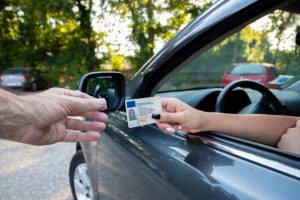
It is never fun being pulled over while driving, and it is certainly never fun being given a ticket. Tickets can be issued for many reasons, including speeding, cell phone use while driving, and reckless driving. If you ever find yourself in your car being followed by flashing lights and sirens, you need to know your rights and not be distracted by urban legends about traffic violations. Below, the Law Office of Andrew Maze busts five traffic violation myths.
Traffic Violation Myths-Fact vs Fiction
- Myth #1: If there are any errors on your traffic ticket, it will be automatically dropped.
Only a very major mistake on your ticket may be grounds for dismissal, and even then, it would not be automatic. Major errors simply would give you a better chance of challenging your ticket in court, not a guarantee of successfully getting it dismissed. Small mistakes including minor typos, spelling errors, or slight physical description errors will not get your ticket dismissed automatically or otherwise. Larger mistakes like listing the wrong driver, an incorrect description of the vehicle, citing an incorrect road location, citing the wrong law, filing the violation in the wrong county, or other substantive errors might help give you grounds to fight the ticket in court. If you do want to fight your ticket in court, please contact The Law Office of Andrew Maze. Myth busted.
- Myth #2: If you refuse to sign a traffic ticket, it will be dropped.
Refusing to sign a traffic ticket does not mean you don’t have to pay it. In reality, refusing to sign will simply irritate the officer issuing the ticket and, later, the traffic court judge. All tickets issued by police are entered into the DMV database and listed on your driving record, whether you have them signed or not. Signing a traffic ticket is also not an admission of guilt, but simply an acknowledgment that you are aware that you have received a citation. It’s also a myth that you can later claim that you did not receive a ticket if you refused to sign it. You can and should sign your ticket when asked to by a police officer; you will have the opportunity to dispute the charges later and, if you wish to do so, you should call The Law Office of Andrew Maze. Myth busted.
- Myth #3: If the issuing officer doesn’t show up in court, your ticket will be dismissed. Also, police officers never show up to traffic court.
Neither of these two contradictory myths about issuing officer attendance in traffic court is true. If the police officer who wrote your traffic ticket fails to appear in traffic court, that does not mean you automatically win. Whether or not ticket-issuing police officers are required to appear in court for traffic ticket hearings varies by state and jurisdiction. Even if a jurisdiction does require officers to appear, the magistrate may decide to re-schedule or continue despite the officer’s absence. It is very rare that a ticket gets dismissed automatically because of an officer not being present. It is also worth noting that just because an officer does not immediately appear does not imply that the officer will skip traffic court altogether. In addition, it is also obviously not true that officers never come to traffic court. Police officers often earn overtime pay when they attend traffic court and, even when they do not receive overtime, it is still part of their job in many places. Myth busted.
- Myth #4: A speeding ticket issued to you in another state will go unnoticed in your home state.
Speeding tickets issued to you in other states will absolutely follow you home. New Jersey and 45 other states are members of a body known as the Driver License Compact. The compact promotes the sharing of driving infraction information between state DMVs. Traffic violations will be forwarded by participating states back home to the state of the recipient and can affect your driver’s license. New Jersey will assign you two points on your license for any minor violations committed out of state. Even if your traffic ticket was issued in one of the handful of states that do not participate in the compact, do not expect to be released from your fine. Citations issued in other states should be treated like you received them at home in the Garden State; disregarding an out-of-state ticket could result in a suspension of your driver’s license and even further criminal charges. Myth busted.
- Myth #5: You can’t fight a speeding ticket in court and win.
Don’t lose hope. There are many cases fought and won in traffic court every year. Preparation is very important if you plan to try and fight a ticket in court. For instance, with a speeding ticket when you are pulled over, note the device used to clock your speed, the police officer’s comfort with using it, and the device’s functionality. Any of these could possibly be grounds for dismissal of your ticket.
Traffic Violations Myths Busted
It is essential to get the proper professional legal representation if you are going to win in court! Now that we have busted the most common traffic violation myths, hopefully, you have a better understanding of how to handle–or how not to handle–getting a traffic ticket. If you have received a ticket for a traffic violation and need legal representation, be sure to call The Law Office of Andrew Maze as soon as possible!